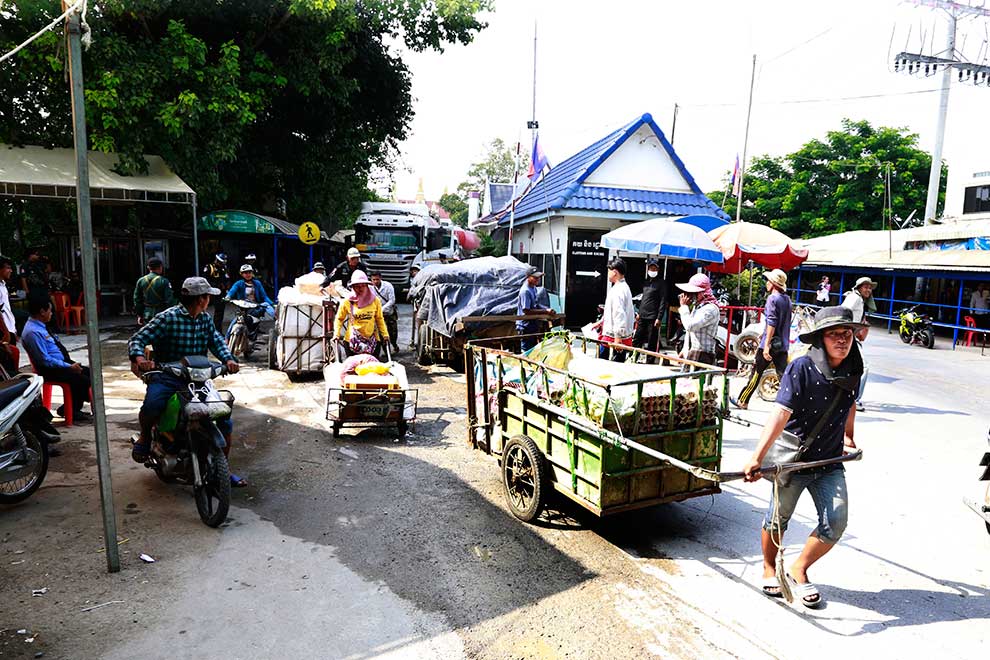
A Cambodian cargo hauler pulls his heavily laden cart past the Poipet International Border Checkpoint in Banteay Meanchey province in 2019. Heng Chivoan
Vendors and cargo haulers using carts at the border in Rong Kluea Market in Thailand are requesting intervention from the Banteay Meanchey provincial authorities to change the five-day border pass fee to a daily pass with reduced payment.
Nuon Sareth, 49, a representative of a group of border cargo haulers working to carry goods in and out of Rong Kluea market, told The Post that Poipet town authorities had previously issued border passes for them and vendors that cost only 10 baht or 1,200 riel per day each way as they travelled there in the morning and returned in the evening.
He said that currently authorities have issued border passes with a duration of five days which cost 50 baht or 6,000 riel, but they required the vendors and cargo haulers to stay on the Thailand side of the border for five days or else renew it each day if they returned home at night.
“It is good for those who have money to rent a room or who have their own stall in the market, so that they can stay there for five days a week. But it is not good for poor people like us, the cart haulers that need to go in and out the market in the morning and return in the evening. Because one pass allows us to cross the border and return once only,” he said.
According to Sareth, cargo haulers working at the Rong Kluea market in Thailand who cross to go to work there via the Poipet-Klong Luk International Border Crossing often have to cross the border two or three times per day, which means they need to spend 100-150 baht per day on fees, while earning only 150 baht per each load of 15-20 kg of goods they are transporting.
“This is why we have insisted that the Poipet town and Banteay Meanchey provincial authorities help us by creating a one-day border pass that costs 10 baht, like before. It’s too hard for us to earn a living with the current prices, they are too high,” he said.
Similarly, Ouk Ravan, a vegetable seller at the Rong Kluea market, told The Post that she entered the market in the morning and returned to her home in Poipet town’s Baliley commune each evening, which means she had to spend 50 baht or 6,000 riel per day on the pass, while she earned only 250 baht per day from selling vegetables.
“We request that the authorities think about the hardship this causes for poor vendors who sell vegetables for a living and reduce the fee to only 10 baht per day like before the Covid-19 outbreak,” she said.
According to Ravan, in early November nearly 100 vendors protested and asked the Cambodian consulate general to intervene to facilitate their children’s ability to go to school in Thailand without having to pay 100 baht to the authorities or equal to 12,000 riel, but almost a month later they haven’t seen any changes.
Banteay Meanchey provincial administration spokesman Sek Sokhom said the provincial authorities had already received requests from the representatives of the groups impacted and that they held a meeting to find a solution but they need to discuss it with the Thai side.
“Our provincial administration had a meeting about the people’s requests already, but they need to be patient because we are on the border with Thailand, so we needed to meet to discuss it first because we cannot do anything on our own about this. Now, our provincial administration will try to cooperate with the Thai side to resolve this issue and change things back to how it was normally prior to the Covid-19 situation,” he said.
He said the current fee schedule came about during the Covid-19 outbreak in Cambodia and Thailand and was connected to the reopening of border, which was done incrementally and needed to be agreed upon by both sides at each stage.









